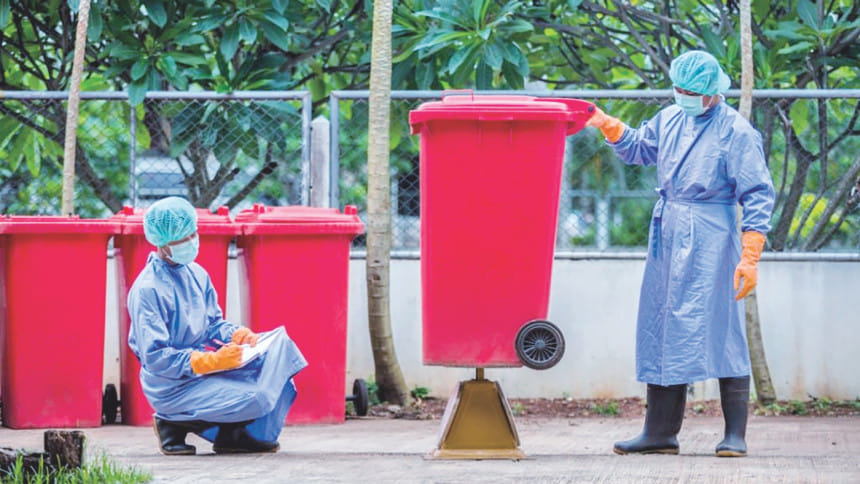For effective management of medical waste

Medical wastes have been the reason of thousands of deaths around the world. According to the United Nations Conference on Environment and Development, 5.2 million people including 4 million children die due to medical waste related diseases. Almost 85 percent sharp injuries are caused because of subsequent use and disposal of medical wastes.
Bangladesh Medical Waste Management and Processing Rules 2008 deals with the waste disposal of different medicals and hospitals in our country. There are no other legislation pertaining to management and processing of medical wastes. But with remoter interpretation section 269 of the Penal Code 1860 may be found relatable. The section enumerates, any person who neglectfully or illegally does any act, which may cause the outbreak of contagious disease and harm public health shall be punished with 6 months' imprisonment or fine or both.
In our country, where problems remain unsolvable even with stricter laws, enacting rules is 'a white elephant' to our medical governance. Rule no. 8 of the Medical Waste Management and Processing Rules devises to establish dumping zones in seven divisional areas. However only Dhaka has the only specialised dumping ground for the disposal of medical wastes; that too is very insufficient to meet the demands of increasing number of hospitals in Dhaka. Rule no. 3 prescribes the establishment of 7 divisional authorities in 7 divisions of our country; under this Rule, this was supposed to be done within three months of the enactment of these Rules. Unfortunately, even after 11 years of enactment, neither the divisional authority has been formed nor has anyone looked after the management and disposal of medical wastes.
Rule no. 7 directs the keeping of wastes separate from other general waste during the collection, wrapping, storing and transportation. But almost all the hospitals dispose their wastes by mixing them with general wastes without sterilising the same. As the protected areas for the disposal of medical wastes are not established, the wastes are disposed of in canals or open dumping zone ultimately harming the environment and food chain. Under Rule no. 5, three types of licenses would be given for - (1) wrapping and storing, (2) collection and transportation, and (3) refining and removal to a third party to deal with disposal mechanism. Unfortunately, these three tasks are to be dealt with by a single stakeholder as third party. Ultimately compact disposal mechanism becomes very tough to be realised. The wastes become blended during any of these procedures. Also, training was supposed to be given for a better disposal structure under Rule no. 6 to the third parties. As the divisional authorities were not formed, training for the disposal staffs seems a castle in the air.
Some NGOs namely Prism Bangladesh Foundation, Nobo Waste Management, Chattogram Seba Songstha and Prodipon etc. are working as third party by making contracts with the hospitals. But this does not meet the demands of healthy waste disposal mechanism. Even the medical care professionals show reluctance towards maintaining comprehensive waste disposal mechanism. Authority alone cannot make any viable change without cooperation from hospitals and their professionals. If any outbreak of epidemics occurs due to such malpractice, health governance of our country will go under serious turmoil.
Ambiguities regarding the approval and determination of license to the third party, or the determination of authority itself need to be revisited. Whether the Department of Environment looks after the waste management and implements the Rules or the City Corporation shall be held responsible for not maintaining the proper mechanisms to dispose the medical wastes, shall be determined as early as possible. All these voids shall be filled with concrete directions. Our country may strictly adopt 'Duty of Care' principle whereby the medical professionals will be assessing risks of disposing medical waste in a particular manner. Further, the medical waste (hazardous waste) shall be separated from the normal waste (non-hazardous waste) by the medical professionals. Then, it may set charges depending on the weight and probable harm may be caused by the wastes following the 'Polluter Pays' principle of international environmental law. The principle prescribes "he who produces hazardous substances, shall carry the responsibility of disposing to save environment from an imminent harm."
Moreover, a single organisation may not be licensed to dispose, transport, collect or remove the medical wastes. Three or four different institutions may be vested and licensed with different responsibilities. Additionally, all hospitals shall collect two certificates, (1) Location certificate, and (2) Environment Clearance Certificate after conclusive Environment Impact Assessment. The assessment must show whether the wastes will be disposed of following the mechanism devised by Medical Waste Management and Processing Rules 2008. Most significantly, the divisional authorities shall be formed and protected disposal zones shall be established within no time to tackle the unseen but foreseeable hazard. Lastly, the Department of Environment, City Corporation and Bangladesh Medical & Dental Council shall work hand in hand for a healthy medical waste disposal system.
The writer is Lecturer in Law, Feni university.

 For all latest news, follow The Daily Star's Google News channel.
For all latest news, follow The Daily Star's Google News channel. 



Comments